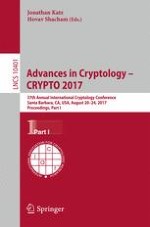2017 | OriginalPaper | Buchkapitel
Conditional Disclosure of Secrets: Amplification, Closure, Amortization, Lower-Bounds, and Separations
verfasst von : Benny Applebaum, Barak Arkis, Pavel Raykov, Prashant Nalini Vasudevan
Erschienen in: Advances in Cryptology – CRYPTO 2017
Aktivieren Sie unsere intelligente Suche, um passende Fachinhalte oder Patente zu finden.
Wählen Sie Textabschnitte aus um mit Künstlicher Intelligenz passenden Patente zu finden. powered by
Markieren Sie Textabschnitte, um KI-gestützt weitere passende Inhalte zu finden. powered by
Abstract
-
(Closure): A CDS for f can be turned into a CDS for its complement \(\bar{f}\) with only a minor blow-up in complexity. More generally, for a (possibly non-monotone) predicate h, we obtain a CDS for \(h(f_1,\ldots ,f_m)\) whose cost is essentially linear in the formula size of h and polynomial in the CDS complexity of \(f_i\).
-
(Amplification): It is possible to reduce the privacy and correctness error of a CDS from constant to \(2^{-k}\) with a multiplicative overhead of O(k). Moreover, this overhead can be amortized over k-bit secrets.
-
(Amortization): Every predicate f over n-bit inputs admits a CDS for multi-bit secrets whose amortized communication complexity per secret bit grows linearly with the input length n for sufficiently long secrets. In contrast, the best known upper-bound for single-bit secrets is exponential in n.
-
(Lower-bounds): There exists a (non-explicit) predicate f over n-bit inputs for which any perfect (single-bit) CDS requires communication of at least \(\varOmega (n)\). This is an exponential improvement over the previously known \(\varOmega (\log n)\) lower-bound.
-
(Separations): There exists an (explicit) predicate whose CDS complexity is exponentially smaller than its randomized communication complexity. This matches a lower-bound of Gay et al., and, combined with another result of theirs, yields an exponential separation between the communication complexity of linear CDS and non-linear CDS. This is the first provable gap between the communication complexity of linear CDS (which captures most known protocols) and non-linear CDS.
